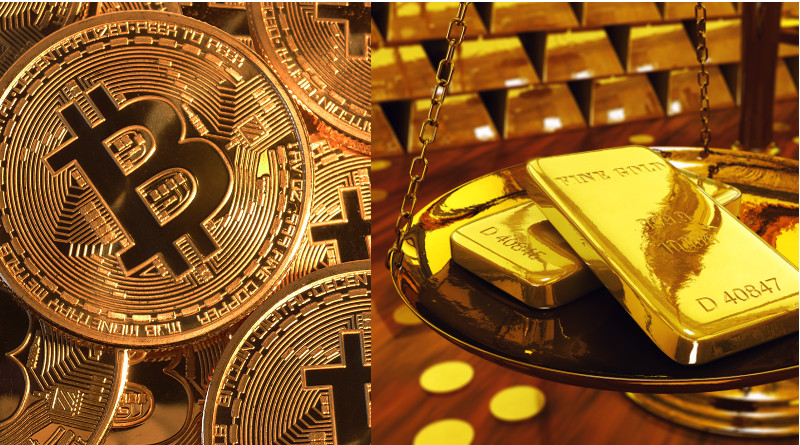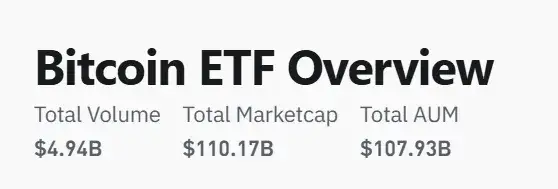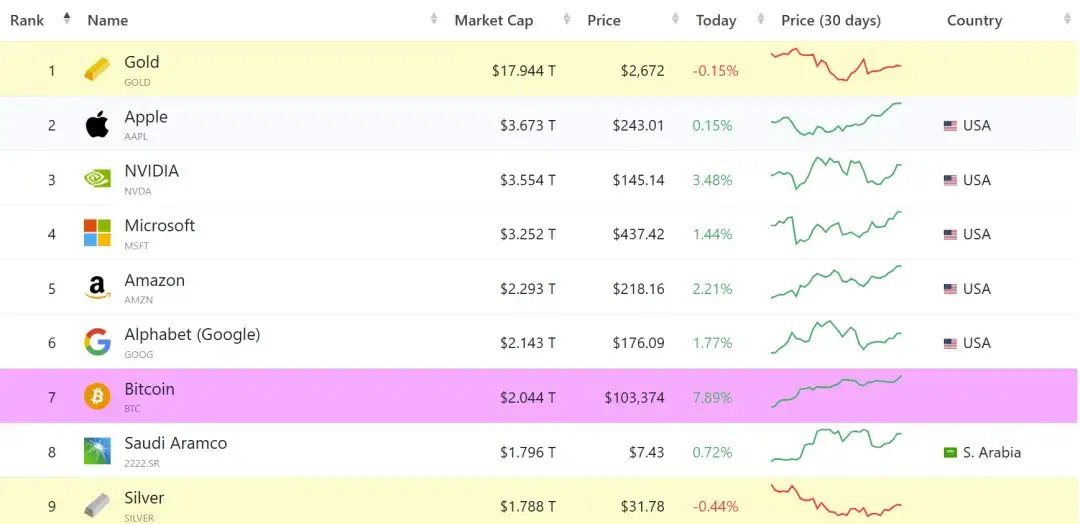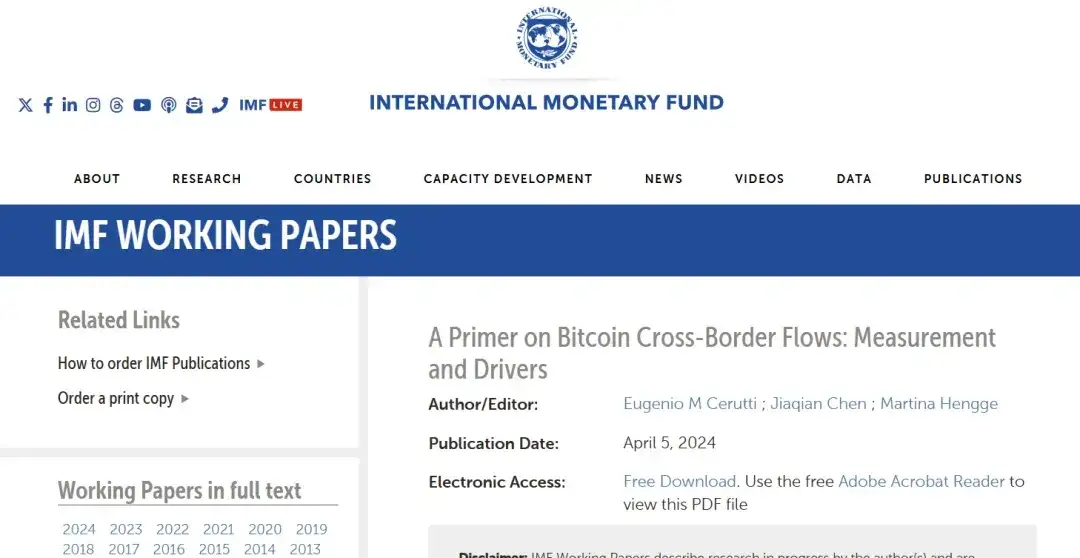Is Bitcoin Shaking the Position of Gold?
Author: Mu Mu | Blockchain in Plain Language

Recently, Bitcoin has been fluctuating near the $100,000 mark and finally broke through this important "psychological" barrier today. In fact, the recent crazy rise of Bitcoin has already overshadowed the similarly significant rise of gold. Perhaps as some countries, including the United States, propose to consider Bitcoin as a strategic reserve, the corner of gold has already been dug out by Bitcoin:
Ten years ago (December 2014), gold was 250 yuan/gram, and ten years later, it is 630 yuan/gram, a 2.5 times increase in ten years. Ten years ago (December 2014), Bitcoin was $360/coin, and ten years later, it is $100,000/coin, a 277 times increase in ten years.
Years ago, when the concept of "digital gold" was first proposed, anyone who mentioned it would be met with skeptical looks. However, ten years have passed, and Bitcoin is growing at an astonishing rate, to the point where it is finally beginning to shake the unbreakable position of gold that has lasted for thousands of years…
01
Gold VS Digital Gold Bitcoin
Bitcoin is referred to as digital gold because it shares some characteristics with gold, but many people still find it difficult to associate physical and virtual assets. Perhaps this needs to start from the background of Bitcoin's birth…
1) Background of Bitcoin's Birth
Thousands of years ago (the exact date is uncertain), gold was already "hard currency." It was first recorded as currency over two thousand years ago during the Spring and Autumn period and has been used ever since. People hold and use gold without any restrictions from individuals, institutions, or even countries, truly achieving "private property is inviolable."
Historical records show that in 1717, Isaac Newton in England was the first to propose the gold standard (a monetary system where gold is the base currency, and the amount of currency issued and its exchange value is determined by the country's gold reserves), which was subsequently adopted by various countries around the world. Until 1971, when U.S. Secretary of State Henry Kissinger announced the plan to abandon the gold standard, the currencies of the U.S. and other countries were no longer governed by gold, meaning that the value of currency was no longer limited by gold reserves. This meant that the modern monetary system could adjust depreciation and inflation as needed.
Later, during the 2008 global financial crisis, the U.S. printed a large amount of money to bail out banks, leading the public to discover that the money in their pockets was being diluted, causing strong dissatisfaction and distrust in the financial system, which left some textual clues for Satoshi Nakamoto's intention to create Bitcoin.
This is also why Satoshi Nakamoto left this message in the genesis block of Bitcoin: "The Times 03/Jan/2009 Chancellor on brink of second bailout for banks."
The traces left by Satoshi Nakamoto before his sudden disappearance led many to believe that Bitcoin was a response to the events of the 2007-2008 financial crisis. In a message board aimed at peer-to-peer foundations, Satoshi Nakamoto wrote an article in February 2009 introducing Bitcoin.
In the article, they expressed distrust in reserve banks and concerns about assets: "We must trust banks to hold our money and transfer it electronically, but they will issue it during the bubble wave, while reserves are minimal. We must trust them with our privacy, not letting identity thieves drain our accounts. Their huge intermediary fees make small payments impossible."
2) What Are the Specific Similarities Between Gold and Bitcoin?
A. Decentralization
Gold: A natural resource found all over the Earth, anyone can potentially mine gold from some corner.
Bitcoin: A public blockchain with nodes distributed globally, allowing anyone to participate in mining.
B. Mining
Gold: Mining requires workers, mines, equipment, and electricity.
Bitcoin: Bitcoin mining also requires block producers, mines, equipment, and electricity.
C. Scarcity
Gold: A non-renewable natural resource.
Bitcoin: A capped supply of 21 million coins.
D. Durability
Gold: Physically stable, never rusts.
Bitcoin: A robust and secure network, with on-chain data that never fades.
E. Counterfeit Resistance
Gold: Real gold is not afraid of fire.
Bitcoin: No amount of money can alter it.
That said, while they are very similar in some aspects, digital gold still has many advantages that physical gold cannot match, such as:
· Bitcoin is very easy to carry; you only need to remember a string of words, while physical gold is particularly heavy;
· Bitcoin can be verified for authenticity anytime and anywhere, while physical gold can easily be faked with metals of similar density (in recent years, there have been numerous cases of counterfeit gold jewelry);
· Bitcoin is easier to divide for transactions, while gold is the opposite;
· Bitcoin transactions can often reach hundreds of millions of dollars with fees only in the tens of dollars, while gold and even the modern banking system find it difficult to achieve such low and fast asset transfer costs.
02
Bitcoin Has Dug into the Corner of Gold
1) Grayscale's Multiple Advertisements Suggesting Bitcoin Replace Gold
Grayscale launched its first Drop Gold campaign on May 1, 2019, with advertisements themed "Drop Gold," reminding people that it is time to replace gold with Bitcoin.
In 2020, Grayscale and DCG founder Barry Silbert tweeted that Grayscale had relaunched the anti-gold advertisement "Drop Gold," which began airing on all major networks in the U.S. This is a marketing campaign for Bitcoin, with the video stating that "digital currencies like Bitcoin are the trend of the future," aiming to promote Bitcoin as a tool for value storage in the 21st century.
In fact, years ago, Grayscale's advertisements were largely ignored by most people, including some financial institutions. Some financial tycoons even scoffed at it; for example, the famous CEO of BlackRock, Larry Fink, bluntly stated that Bitcoin was worthless! However, just recently, Larry Fink changed his view, saying: BTC will disrupt traditional finance.
Now, BlackRock has become a Bitcoin whale, holding nearly 500,000 BTC. Bitcoin Whale.
2) Rapid Inflow of Spot ETF Funds
As early as 2020, JPMorgan Chase, the largest bank by total assets in the U.S., released a report studying the success of the Grayscale Bitcoin Trust (GBTC), which was once one of Bitcoin's biggest critics. However, the report acknowledged that the demand for Bitcoin even affects mature markets.
JPMorgan pointed out that the demand for Bitcoin could erode the demand for gold ETFs. According to this study, the number of people flowing into Grayscale's Bitcoin Trust in October 2023 was significantly higher than that of gold ETFs. Therefore, this American bank concluded that GBTC might capture some market share from gold ETFs.

coinglass: The current total market value of BTC ETFs has exceeded $110 billion.
Sure enough, after the launch of the Bitcoin spot ETF, it received a large inflow of funds, while gold ETFs saw a significant outflow. Many financial commentators have pointed out that this is not a coincidence; the Bitcoin spot ETF has attracted a large amount of capital, a significant portion of which has come from gold ETFs. Recently, some media reported that BlackRock's IBIT asset management scale has surpassed the largest silver ETF, and BlackRock now holds over 500,000 BTC, far exceeding the largest silver ETF.
3) Bitcoin Ranks in the Top 10 Global Asset Market Values
As of December 5, according to the global asset ranking list from Companiesmarketcap, Bitcoin, with a market value of $2 trillion, surpasses silver and ranks 7th in global asset market value. Currently, Bitcoin's market value has also surpassed the total market value of the four largest banks in the world.

Top 10 Global Asset Rankings, Source: Companiesmarketcap
Bitcoin is still over seven times away from gold's market value of $15 trillion, which may not seem like a very difficult task for Bitcoin, which has grown 277 times in ten years, in the eyes of many in the crypto asset circle.
Recently, Anthony Scaramucci, CEO of SkyBridge Capital and a senior hedge fund manager, stated that Bitcoin's market value will eventually exceed gold's $16 trillion market value. In an interview with CNBC, the founder of SkyBridge Capital referred to Bitcoin as a high-quality asset that has never been seen in the past 5,000 years of human history.
Scaramucci mentioned that Bitcoin still has a long way to go to reach gold's $16 trillion market value, but he believes that as regulators approve BTC ETFs, the distance will narrow over time.
4) Bitcoin is Playing a "Hedge" Value
Most of the time, gold serves as a hedge against inflation risk in many people's portfolios, which can also be seen as a manifestation of a safe-haven asset. However, the fact is that gold has not outperformed inflation for most of the time. In contrast, Bitcoin, which has consistently reached new highs, has a fixed supply chain limit and undergoes halving every four years, seems to have never let anyone down in this regard.
Due to a general consensus, gold has very low volatility, while Bitcoin is quite the opposite. Therefore, while Bitcoin has higher growth potential, it also carries higher risks. However, Bitcoin's volatility is gradually decreasing, and it is truly becoming an optional "hedging tool" for countries with high inflation…
Recently, a new report from the International Monetary Fund (IMF) titled "A Primer on Bitcoin Cross-Border Flows" pointed out that BTC has become a necessary financial tool for preserving wealth in times of financial instability. The analysis also noted that on-chain Bitcoin transactions, which are recorded on the blockchain and provide higher security, are often larger than off-chain transactions. This indicates that the powerful security features of blockchain technology typically protect larger financial interests.

The report's authors stated that Bitcoin transactions provide individuals in high-inflation countries with a way to save stably and participate in global commerce in ways that cannot be achieved with local currency.
From another perspective, when missing out is also seen as a "risk," Bitcoin, as an "alternative asset," is added to many investors' portfolios, often considering the hope to hedge against the risk of not being able to timely enter the future Web3 technology and missing out on crypto assets.
When the crypto market worsens, some people choose to exchange high-risk altcoins for more stable, lower-risk Bitcoin, thus timely stopping losses and reducing risks without the risk of missing out. Therefore, Bitcoin is often used to hedge against the high risks brought by altcoin assets.
03
Conclusion
In fact, it is not surprising that Bitcoin is gradually eroding gold's market share. The relationship between "digital gold" and "gold" is similar to that between "digital payments" and "paper money." Times are advancing, and the usage of paper money is decreasing. Ancient gold may not meet everyone's needs, thus Bitcoin fills this gap. As for whether Bitcoin can gradually surpass gold, that remains to be seen with time.
Article link: https://www.hellobtc.com/kp/du/12/5570.html
Source: https://mp.weixin.qq.com/s/OaIOZoIx0fs8WUlIN6Htfw
免责声明:本文章仅代表作者个人观点,不代表本平台的立场和观点。本文章仅供信息分享,不构成对任何人的任何投资建议。用户与作者之间的任何争议,与本平台无关。如网页中刊载的文章或图片涉及侵权,请提供相关的权利证明和身份证明发送邮件到support@aicoin.com,本平台相关工作人员将会进行核查。



